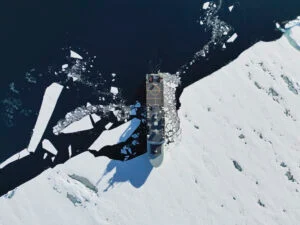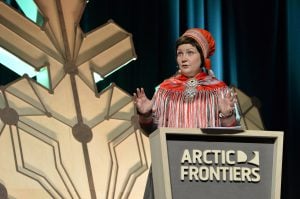
People & Culture
On thin ice: Who “owns” the Arctic?
As the climate heats up, so do talks over land ownership in the Arctic. What does Canadian Arctic Sovereignty look like as the ice melts?
- 4353 words
- 18 minutes
This article is over 5 years old and may contain outdated information.
People & Culture

The Northwest Passage was one of the most coveted geographical prizes of the 19th century. Dozens of ships attempted to find it, and most, like the doomed Franklin expedition, failed. Times have changed, however; ever-growing numbers of cruise ships and freighters make the transit each year with the benefit of modern charts, satellite navigation and thinning ice.
This week, Canada is taking the reins of the Arctic Council as the Northwest Passage literally and figuratively heats up. Canada claims rights to the route, although that has been disputed by other nations – but that is far from the only disputed claim in the Arctic. Debates over mineral rights, territorial boundaries and Aboriginal rights have been ongoing for centuries.
In order to provide a forum for some of these discussions, the Arctic Council was established over the course of the 1990s and includes all countries with territory in the Arctic: Canada, the United States, Russia, Sweden, Finland, Norway, Iceland and Denmark (which represents its dependencies in Greenland and the Faroe Islands). Canada served as the first chair of the Council from 1996-1998.
The work of the Arctic Council
Most of the decisions made at the Arctic Council never become legally binding treaties. To date, only one document has become binding for the member states: a treaty on search-and-rescue. But that isn’t to say that the work the Council does is unimportant; it is one of the few bodies in the world focused on the serious environmental, economic and social issues facing the Arctic and its people, and the world’s only circumpolar political forum.
In the last two years, the chairmanship has been held by Sweden. In last year’s meeting in Stockholm, working groups reported on oil spill preparedness and climate change adaptation, and similar reports are expected at the Kiruna ministers’ meeting. Five of the six current working groups are reporting on issues of environmental importance, from heavy metal contamination to wildlife conservation.
On top of these ongoing issues, Canada’s incoming chairperson, Health Minister Leona Aglukkaq, has announced plans to integrate industry interests into the workings of the council.
New observers
The Arctic Council is structured to allow various degree of involvement for nations
and groups without Arctic territory. Some indigenous groups are considered “permanent participants,” meaning that they have the right to consultation in relation to the council’s negotiations and decisions and can address the council and raise points of order. Observer nations, permanent or ad-hoc, are allowed to attend meetings and join working groups. Even some nongovernmental groups, such as the United Nations Development Programme and the International Red Cross, have observer status.
However, with the growing international interest in the North, some ad-hoc observer nations are seeking a bigger role. China and the EU have requested permanent observer status, along with India, Japan, Italy, Singapore, Mongolia and South Korea. Already, six European nations are permanent observers. To achieve this status, permanent observers are required to recognize the rights of Arctic nations on the council’s terms; this includes recognizing their sovereignty in the Arctic, the rights of indigenous peoples and the role of the Arctic Council as an authority. The member states will decide on whether to grant observer status to these countries at this week’s meeting in Kiruna, Sweden; Canada and Russia have already expressed a reluctance to give the non-Arctic states a bigger role.
Are you passionate about Canadian geography?
You can support Canadian Geographic in 3 ways:

People & Culture
As the climate heats up, so do talks over land ownership in the Arctic. What does Canadian Arctic Sovereignty look like as the ice melts?

Environment
The uncertainty and change that's currently disrupting the region dominated the annual meeting's agenda

People & Culture
The story of how a critically endangered Indigenous language can be saved

People & Culture
The Inuit Circumpolar Council’s chair on how Inuit are speaking up about climate change with a global voice